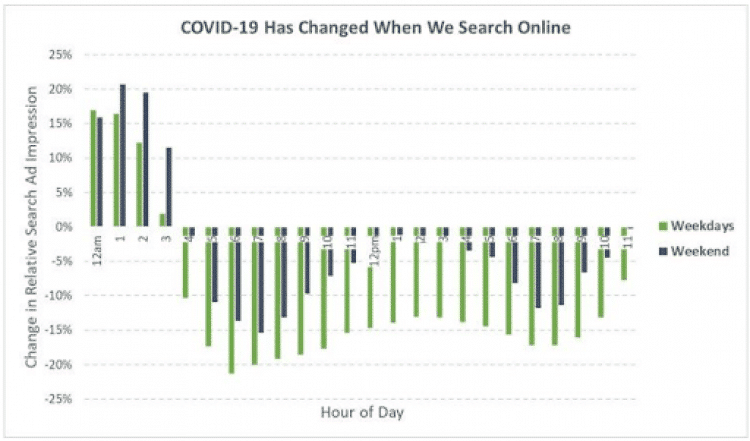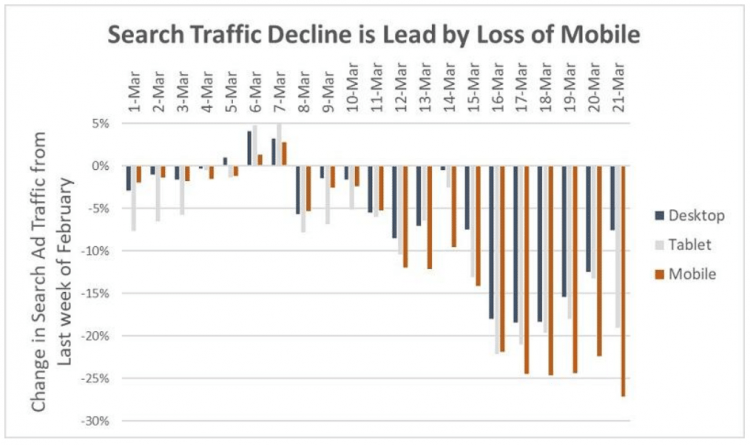Media Habits and Media Consumption
Well, you’re at home. All day. Every day. And night.
Obviously the way you consume media has changed significantly. How, where, when and why customers consume media dictates how a marketing campaign should be planned to be efficient.
Organic traffic from SEO is a 24-7, 365 foundation that is built over time. Keywords searched are changing for organic traffic and should be targeted with new, relevant content. But for paid advertising, in order to maintain or capitalize on transforming habits caused by shelter in place, more variables are involved, and the speed at which we adapt will make or break our recovery.
Weekday vs Weekend and Hour of Day
What day is it? Saturday? Feels like a Tuesday…
With the majority of the workforce being home 9 to 5 (and also 5 to 9), the time of day is less relevant. Late night searches have spiked considerably. For paid advertising, marketers must consider new dayparting and open up days of the week to try to acquire cheaper cost per conversions.
Bidding adjustments, bid modifiers and new bidding strategies should be tested for each industry, keeping in mind that conversions may be displaced and there is still value in branding with the right message during the Covid-19 crisis. Branding now, creates a greater impression frequency and increases the likelihood of a future conversion.

Mobile vs Desktop
Another Bidding adjustment that should be tested is mobile vs desktop. With less travel, and less movement altogether, mobile device usage is down 24%. Mobile activity is still greater than Desktop, but depending on your industry, your cost per conversion has likely changed to favor desktop slightly more than pre-covid-19. Here at Whiteboard Marketing, we are seeing surges in both desktop and even tablet conversions in relation to mobile.
Be sure that even in our mobile-first society, you are not ignoring the user experience on larger screens. In many cases desktop users convert at a considerably higher rate than mobile.

What Keywords Are People Searching For?
Add Covid-19 or Coronavirus to any keyword and you can bet that it is being searched. But for dentists, patients are looking for the when and how of reopening. Will it be safe? Will I be able to get an appointment? When I get an appointment, are there changes from when I used to come to the office?
Through Google Trends we can track what search terms are popular. All of the most important questions, like, what buffets are closing, when do nail salons reopen, and of course, when will my dentist reopen. Patients are using new keywords to search for a dentist. Patients are adding words like “safe,” “open,” and “coronavirus” to their search efforts. A look at Google Trends shows us that these added keywords are a national trend, that Google considers a “breakout.” Breakout keywords mean that Google is experiencing an increasingly high volume of searches with these terms.
These changes in searches should trigger urgent changes to your marketing strategy. Your content should include sterilization and safety protocols, and your keywords should target reopening and safety terms.
Many of these keywords, we have already incorporated into our clients’ PPC and SEO keyword targeting strategies… others are just interesting to note:
Here are some examples of keywords we are seeing on Google Trends. Hours, open, and safety are primary concerns as seen in these search trends.
When Coronavirus forced offices to close, many dentists immediately cut PPC advertising and SEO. With the aforementioned changes in keyword targeting paired with the decreased competition, we have seen costs-per-click (CPC) across all campaigns at half of what they were prior to the crisis. We are still seeing this trend in lower CPC even as practices have re-opened across the country. These changes translate into double the traffic for clients, a lower cost per conversion, and a higher ROI for those who are willing to invest in marketing and advertising.
If you are interested in learning more about these trends and how they may impact your business, contact us. We can provide insights into how patients are searching for you and strategies for acquisition and retention.
